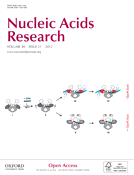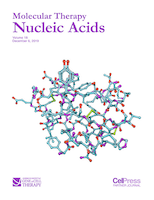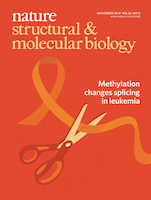
NUCLEIC ACIDS RESEARCH
Scope & Guideline
Exploring the Frontiers of Genetic Discovery
Introduction
Aims and Scopes
- Nucleic Acid Structure and Function:
Research focusing on the structural and functional aspects of DNA and RNA, including studies on G-quadruplexes, ribozymes, and RNA modifications. - Gene Regulation and Expression:
Explorations of the mechanisms that control gene expression, including transcription factors, enhancers, silencers, and the role of non-coding RNAs. - DNA Repair and Replication:
Investigations into the molecular mechanisms of DNA repair pathways, replication processes, and the impact of various factors on genomic integrity. - CRISPR and Genome Editing Technologies:
Studies on the development and application of CRISPR and other genome editing technologies, including their mechanisms, efficiency, and specificity. - Epigenetics and Chromatin Dynamics:
Research addressing the role of epigenetic modifications and chromatin structure in regulating gene expression and maintaining genomic stability. - Bioinformatics and Computational Biology:
Development and application of computational tools and databases for analyzing nucleic acid sequences, structures, and interactions.
Trending and Emerging
- RNA Modifications and Function:
Research focusing on various RNA modifications, such as m6A and pseudouridylation, is gaining momentum, emphasizing their roles in gene regulation, stability, and cellular responses. - CRISPR Technologies and Applications:
There is a rapidly growing body of work exploring novel CRISPR applications, including base editing, epigenome editing, and their therapeutic potential in various diseases. - Synthetic Biology and RNA Engineering:
Emerging studies on engineered RNA molecules and synthetic biology approaches are trending, particularly in the context of developing novel therapeutics and gene regulation systems. - Phase Separation and Biomolecular Condensates:
Research on the role of phase separation in cellular organization and function is increasingly prominent, particularly in relation to RNA-binding proteins and their interactions. - Metagenomics and Microbiome Studies:
The integration of nucleic acid research with metagenomics and microbiome analysis is on the rise, showcasing the importance of microbial communities in health and disease. - Machine Learning in Genomics:
The application of machine learning techniques to analyze genomic data and predict functional outcomes is an emerging trend, facilitating more efficient data interpretation and discovery.
Declining or Waning
- Traditional Molecular Biology Techniques:
There has been a notable decrease in publications centered around classical molecular biology techniques, such as basic cloning and PCR methods, which have been largely supplanted by more advanced and sophisticated technologies. - Single-Gene Studies:
Research focusing on the characterization of single genes has diminished, as the field increasingly moves towards understanding complex interactions and networks involving multiple genes and regulatory elements. - Static Structural Studies:
Static studies that provide a snapshot of molecular structures without dynamic considerations are becoming less prominent, as researchers prioritize studies that incorporate dynamic and functional aspects of nucleic acids. - Basic RNA Isolation Techniques:
The frequency of articles dedicated solely to basic RNA isolation and purification techniques has decreased, as researchers now often integrate these methods within broader studies of RNA function and dynamics.
Similar Journals

Molecular Therapy Nucleic Acids
Advancing nucleic acid innovations for a healthier tomorrow.Molecular Therapy Nucleic Acids is a premier open-access journal published by CELL PRESS, dedicated to advancing the field of molecular medicine through the innovative application of nucleic acid-based therapies. Since its inception in 2012, this journal has become an essential resource for researchers and professionals in drug discovery and molecular medicine, reflected in its status as a Q1 journal in both categories for 2023. With a notable impact factor and high rankings in Scopus, including #8 out of 157 in Drug Discovery and #16 out of 178 in Molecular Medicine, it serves to disseminate groundbreaking research and foster collaborations among scientists worldwide. The journal's comprehensive scope encompasses a wide variety of topics, including gene therapy, RNA interference, and CRISPR technology, ensuring that it remains at the forefront of scientific excellence. With open access availability, Molecular Therapy Nucleic Acids actively promotes the widespread dissemination of knowledge, making its crucial insights accessible to students, researchers, and industry professionals alike.

CHROMOSOMA
Shaping the Future of Genetics, One Study at a TimeCHROMOSOMA is a prestigious journal dedicated to advancing the field of genetics, published by Springer in Germany. With an ISSN of 0009-5915 and an E-ISSN of 1432-0886, this journal has been a cornerstone in the publishing landscape since its inception in 1939, serving as a critical resource for researchers and professionals interested in the intricacies of chromosomal biology. Although it operates on a subscription basis, the journal's rigorous peer-review process ensures the dissemination of high-quality research findings. With a commendable Q2 ranking in both genetic and clinical genetics categories as of 2023, CHROMOSOMA aims to bridge theoretical concepts with practical applications in medicine and biology. Researchers will appreciate its relevance, as indicated by its Scopus ranks and integration of diverse topics ranging from molecular genetics to clinical implications. By fostering collaboration and knowledge-sharing among scholars, CHROMOSOMA continues to shape the future of genetic research.

NAR Cancer
Fostering collaboration to conquer cancer challenges.NAR Cancer, published by Oxford University Press, is a pioneering open access journal established to advance the rapidly evolving field of cancer research. Since its inception in 2019, this journal has gained substantial recognition, achieving a prestigious Q1 ranking in both Cancer Research and Oncology categories as of 2023. With a focused objective to disseminate high-quality research, reviews, and insights into innovative cancer treatments and diagnostics, NAR Cancer serves as an essential platform for researchers, healthcare professionals, and students alike. The journal is accessible for all since it became open access in 2020, ensuring a global reach and impact. Positioned in the competitive landscape of oncology, with impressive Scopus rankings, it offers a unique opportunity for contributors to share their work with an engaged and interdisciplinary audience. With a commitment to excellence, NAR Cancer is dedicated to driving forward the understanding and management of cancer worldwide.

MOLECULAR BIOLOGY OF THE CELL
Connecting Discoveries in Molecular and Cellular ScienceMOLECULAR BIOLOGY OF THE CELL is a prestigious journal published by the American Society for Cell Biology, focusing on the latest advancements in cell biology and molecular biology. Established in 1990, this journal serves as a vital forum for disseminating innovative research, methodologies, and insights that drive the understanding of cellular processes and their implications in health and disease. With a noteworthy impact factor and recognition within the top quartiles for both Cell Biology and Molecular Biology, it ranks prominently among its peers, with Scopus rankings reflecting its significance in the scientific community. Although the journal does not follow an open access model, it provides essential access options for both institutional and personal subscriptions. Researchers, professionals, and students seeking to expand their knowledge and collaborate on groundbreaking findings will find MOLECULAR BIOLOGY OF THE CELL an invaluable resource in the field.

Nucleic Acid Therapeutics
Unlocking the Potential of Nucleic Acids in Medicine.Nucleic Acid Therapeutics is a leading peer-reviewed journal published by Mary Ann Liebert, Inc that focuses on the forefront of research in the fields of biochemistry, drug discovery, genetics, and molecular medicine. With an impressive Q1 ranking across multiple categories, including biochemistry and drug discovery, the journal aims to disseminate innovative findings on nucleic acid-based therapies, their mechanisms, and clinical applications. The journal is dedicated to advancing the understanding of nucleic acids in the development of new therapeutic strategies, appealing to a diverse audience of researchers, professionals, and students alike. Given its commitment to open access publishing, Nucleic Acid Therapeutics ensures that groundbreaking research is accessible, fostering collaboration and dialogue in this critical area of scientific inquiry. Situated in the United States, Nucleic Acid Therapeutics plays a pivotal role in connecting researchers and practitioners in the ever-evolving landscape of molecular medicine and biotechnology.

GENOME BIOLOGY
Advancing the frontiers of genomics and molecular biology.GENOME BIOLOGY is a premier, peer-reviewed journal published by BMC, focusing on the rapidly evolving fields of genomics, molecular biology, and bioinformatics. Accessible as an Open Access journal since 2000, it aims to disseminate high-quality, cutting-edge research that contributes to our understanding of genome biology's intricate mechanisms. The journal boasts an impressive impact, ranking 8th in Agricultural and Biological Sciences and 9th in Biochemistry, Genetics and Molecular Biology, highlighting its significance among scholars, professionals, and students alike. With a commitment to facilitating the exchange of invaluable scientific knowledge, GENOME BIOLOGY provides an important platform for discussions on evolutionary biology, genetic systems, and cell biology, contributing to the advancement of these dynamic disciplines.

NATURE STRUCTURAL & MOLECULAR BIOLOGY
Unveiling the Secrets of Molecular ArchitectureNATURE STRUCTURAL & MOLECULAR BIOLOGY is a leading journal published by NATURE PORTFOLIO, dedicated to advancing the field of molecular and structural biology since its inception in 1998. With an impressive impact factor that places it in the Q1 quartile across both the Molecular Biology and Structural Biology categories, this journal is pivotal for researchers and professionals seeking to publish innovative and high-impact results. Its Scopus ranking further highlights its elite status, with a remarkable 98th percentile for Structural Biology and 95th for Molecular Biology. While the journal does not currently offer open access, it continues to foster a rich discourse among scientists by providing a platform for the dissemination of groundbreaking research. Located in the United Kingdom and operated from Berlin, the journal's commitment to excellence positions it as an indispensable resource for students, researchers, and practitioners in the realms of biochemistry, genetics, and molecular biology.

Biomolecules
Pioneering insights in biochemistry and molecular biology.Biomolecules is a prestigious, peer-reviewed journal published by MDPI that has been dedicated to advancing the field of biochemical research since its launch in 2011. With an impressive impact factor positioning it in Q1 for Biochemistry and Q2 for Molecular Biology as of 2023, this journal serves as a vital platform for disseminating high-quality research findings related to biological macromolecules, including proteins, nucleic acids, and carbohydrates. Operating as an Open Access journal, it ensures that vital research is accessible to all, furthering knowledge dissemination and collaboration within the scientific community. Located in Basel, Switzerland, the journal has established a significant presence in major academic databases, holding commendable Scopus rankings in both Biochemistry and Molecular Biology. Researchers, professionals, and students will find Biomolecules an invaluable resource for cutting-edge research, reviews, and insights in the rapidly evolving domains of biochemistry and molecular biology.

Non-coding RNA Research
Fostering Global Collaboration in RNA ResearchNon-coding RNA Research, published by KEAI PUBLISHING LTD, is a leading open-access journal dedicated to advancing the field of non-coding RNA, a critical component in the landscape of molecular biology and genetics. Established in 2016, this journal aims to provide a platform for the dissemination of high-quality research focusing on the roles, mechanisms, and therapeutic potentials of non-coding RNAs in various biological processes and diseases. With impressive Scopus rankings placing it in the top quartile for both Biochemistry and Medical Biochemistry, as well as notable standings in Genetics and Molecular Biology, Non-coding RNA Research continues to attract contributions from globally recognized experts. The journal's commitment to open access ensures broad visibility and engagement with cutting-edge discoveries, thereby fostering an inclusive scientific dialogue that enhances understanding and innovation in this rapidly evolving field. For researchers and scholars, the opportunity to publish in a Q1 ranked journal not only validates their work but also enhances its impact, making Non-coding RNA Research an indispensable resource for anyone interested in the intricate workings of non-coding RNA.

GENOME
Unraveling the Complexities of DNA and BeyondGENOME is a leading peer-reviewed journal published by Canadian Science Publishing, dedicated to advancing the field of genetics, biotechnology, and molecular biology. With a strong commitment to disseminating high-quality research, GENOME has earned a reputable spot in the academic community, boasting a Q2 classification in Biotechnology and Medicine (miscellaneous), and a Q3 rank in Genetics and Molecular Biology for 2023. The journal, identified by its ISSN 0831-2796 and E-ISSN 1480-3321, publishes innovative studies that span from 1987 to 2024, ensuring a rich historical context while addressing contemporary challenges in the field. Researchers and professionals are encouraged to contribute and engage with content that shapes the landscape of genetic research. Although the journal does not currently provide open access, it remains a vital resource for those committed to the exploration of genomic sciences, making it an essential read for both seasoned researchers and students alike.